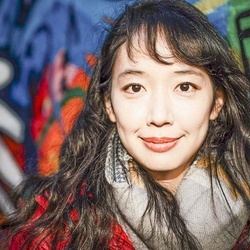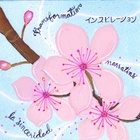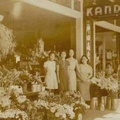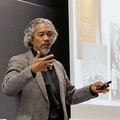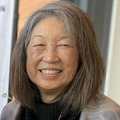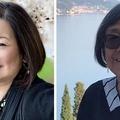What speaks as we continue on, through the generations or through a single moment we need to survive? What does that breath or utterance or silence sound like? In New York-based Professor Christine Kitano’s work that is shared with us here, we are treated to an urgency related to memory and a voice that expands beyond those moments—“...a story without an ending...” and all that allows us to continue. Her striking pieces here let us reflect on the breathlessness of being and how we somehow keep surging, forward. Enjoy...
—traci kato-kiriyama
* * * * *
Christine Kitano is the author of Birds of Paradise (Lynx House Press) and Sky Country (BOA Editions), which won the Central New York Book Award and was a finalist for the Paterson Poetry Prize. She is co-editor of the forthcoming They Rise Like a Wave (Blue Oak Press), an anthology of Asian American women and nonbinary poets. She teaches at Ithaca College and in the MFA Program for Writers at Warren Wilson College. Find her online at www.christinekitano.com.
1942: IN RESPONSE TO EXECUTIVE ORDER 9066,
MY FATHER, SIXTEEN, TAKES
No spare underwear.
No clean shirts, pants, or good shoes.
Instead, a suitcase
of records. His trombone.
This is not the whole story,
and yet, it is true.
It is a story without an ending.
And when I open my mouth
to speak, it continues.
It was originally published in the Sky Country (BOA Editions, 2017) and copyrighted by Christine Kitano.
GAMAN
It was night when the buses stopped.
It was too dark to see the road,
or if there was a road. So we waited.
We watched. We thought of back home,
how the orchards would swell with fruit,
how the trees would strain, then give way
under their ripe weight. The pockmarked
moon the face of an apple, pitted
with rot. But of course not. Someone
would intervene, would make of our absence
a profit. When we came, the boat, anchored
at San Francisco Bay, swayed for hours . . .
the gauntlet of uniformed men so intent
on finding cause to turn us away. And now
again, we wait. We watch. Our American children
press against us with their small backs.
Which gives us pause. For the sake of the children,
we’ll teach them to forgive the fears of others,
the offenses. But what we don’t anticipate
is how the dust of the desert will clot our throats,
how much fear will conspire to keep us silent.
And how our children will read this silence
as shame. However much we tried, we thought,
to demonstrate grace. When the buses stopped,
it was too dark to see the road. Or if there was a road.
It was night. And instead of speaking, we waited.
Instead of speaking, we watched.
It was originally published in the Sky Country (BOA Editions, 2017) and copyrighted by Christine Kitano.
Dumb Luck
Such luck, I think—driving to work, wheels skidding
to a hard stop when a chipmunk darts in front of my car,
pauses, then scurries back into the browning shrubs.
Motionless in that moment, the possibility of one
outcome gives way to another. Then breath, then the voices
on the radio, then they’re saying my name—no, the name
of Dr. Christine Blasey Ford, who has entered the Senate Chamber,
taken a seat. I look around at the empty street, press the pedal.
In exaggerated whispers, the reporters blithely describe her, surprised
she’s not a “surfer girl,” as a woman “under a lot of pressure.”
I’m late for work, unusual for me, but earlier this morning
had heard from a friend about another friend, that her husband
has left her, just months after their marriage and announced pregnancy.
What terrible luck, I said, then wanted to take back, not sure if “luck”
was the right word. This news, and the news on the radio, skirt
each other in my mind, strike sparks when they get close.
Then this: in college, I waitressed at a Korean-owned sushi restaurant
in an unassuming strip mall where I would arrive straight
from class, apply lipstick and eyeliner using a simmering pot
of miso soup as a mirror next to the chefs knifing clean the fish,
sloughed scales sharp and translucent like chips of glass.
It was luck that had gotten me the job, or so I believed—
over eighteen and authentically Japanese (half, anyway)
and enough comprehension of Korean (the other half) to get by
in the kitchen. Korean enough to not question tossing salt
on the front stoop to chase away bad luck,
like that night a man walked into the restaurant,
lifted his hoodie just enough to reveal the triangle butt
of a gun tucked into the waistband of his jeans,
then walked out with our fishbowl of dollar tips.
My boss’s mother, the cook, ran from the kitchen hurling
fistfuls of salt, cursing the gods, her son, and me.
I admit I was distracted by the greasy swastika inked
across the man’s throat, can still see the wound’s wet.
Then, not so much bad luck but still rude, one time an ahjumma
from my boss’s gye group tossed a crumpled napkin at me,
which hit my chest before landing on a tray I was carrying.
And many customers would, at some point as we ferried
platters of raw fish to their tables ask us
where we were from, where we learned to speak
English. Once, a table of white men asks to make me
a deal: they’ll bring me a pie if I say, “Me love you long time.”
They’re older than me, but not by much; they wear trucker-style caps
backwards, the mesh pressing into their pale, fleshy foreheads.
I remember then the sound of their laughter, then their faces reddening,
then the odor of sweat and hormones and stale beer, and the words
spilling out my mouth before I had full comprehension:
“What kind of pie?” It was a joke, I thought, or think I thought,
but their howls sent a phantom finger down my spine.
After my shift, my boss handed me a wad of cash,
said the group had “tipped big,” to buy myself a hamburger
on the drive home. I counted the bills in my car, under a streetlamp
in the parking lot, all those soy sauce-stained one-dollar bills.
I think of myself then, nineteen years old, alone in a dark parking lot,
money fanned across my lap. Nothing but unearned luck has kept me
safe and alive these thirty-three years, a dumb, gift-luck
whose mouth I pry open every morning for inspection.
But not this morning. Through the radio speakers
I hear a woman shivering. I think of my friend, newly pregnant,
also on her way to work, how she’ll twist a ring off her swollen
finger.
I think of the tattooed man’s eyes—what I thought was desperation
but maybe was not, was maybe hate, or power, or fear, or even
hunger—how I couldn’t hold his gaze, my eyes unable to resist
the twisted omen he’d chosen to stab into his flesh.
*
When I was nineteen, alone in that dark parking lot, dollar bills spread
on my lap, thinking (of all things) about a hamburger, I failed to
notice
the white pickup truck that will pull out after me, follow me down
each side street, the red laughter of the men in my rearview mirror,
and for a breathless moment I recognize how this scene is narrowing
to that one outcome, how it feels inevitable, like the easing on
of a mask for a role I had been destined to play. But no. But what luck.
I lost them, made it to the anonymity of the freeway where I
maneuvered
through five lanes of easy traffic, the chorus of identical brake lights
a radiant red shield. Despite the betrayal of my own mouth, through
no good choices of my own, I survived. But is there no other word
for it than luck, or as my mother would later say, bok, fortune—
in her eyes, something you’re either born with,
or not. Such luck to get home safe
when so many do not; is there really no other word?
*This poem was first published in The Margins and #We Too: A Reader, special issue of Journal of Asian American Studies (2021).
© 2017 & 2021 Christine Kitano



